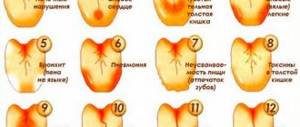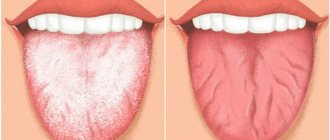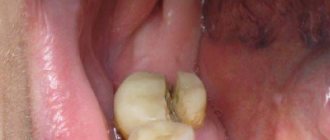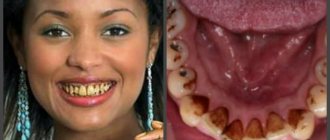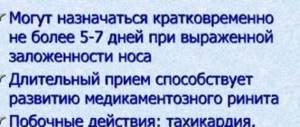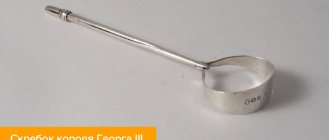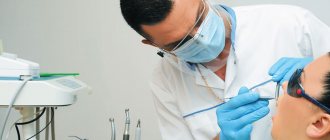How does smoking affect a person's language?
Smoking has a detrimental effect on the entire oral cavity, nasopharynx, bronchi and lungs.
Keep in mind! All mucous membranes are affected by toxic hot smoke. First of all, the tongue is negatively affected.
Nicotine affects the sensitivity of taste buds, which leads to a significant decrease in the sense of taste of food.
Medical studies have proven that smokers and non-smokers have significantly different taste sensitivity thresholds.
This indicates that nicotine contributes to the morphological and functional restructuring of taste buds.
Taste buds not only help you enjoy the taste of food, but also influence the process of salivation, digestion, and the secretion of gastric juice.
Drug treatment
For minor injuries, it is enough to provide first aid to the victim. Further healing occurs naturally, thanks to the antiseptic properties of saliva and the ability of the mucous membranes to quickly restore damaged areas.
In case of serious injury, the doctor may prescribe medications used to treat various types of inflammation and infections of the oral cavity:
- Metrogyl Denta gel - reduces tissue sensitivity, has antiseptic properties, suppresses inflammatory processes;
- Cholisal gel - anesthetizes, relieves swelling, destroys pathogens;
- Periodontocide - promotes tissue regeneration, disinfects, reduces the intensity of pain, relieves inflammation;
- Dental - heals, forms a protective antimicrobial film on the surface, eliminates pain;
- Solcoseryl - accelerates metabolic processes in tissue cells, relieves pain immediately after application, and disinfects.
If the cause of the burn is not chemicals (ammonia, various solvents, acids, alkalis) or their effect is completely neutralized, but deep damage remains, rinsing with antiseptic solutions - Miramistin, Chlorhexidine, Furacilin - is prescribed to disinfect the oral cavity.
What signs of plaque can be identified and what color is it?
Plaque on the tongue is a deposit in the form of bacteria . The plaque layer can be thin or dense.
The color and density of plaque may indicate the presence of certain diseases, so a sudden change in it will help monitor your health.
It is worth noting! In a healthy non-smoker, the plaque is most often thin and white in color. On a smoker's tongue, it most often has a dense texture and can be yellow or gray.
Gradually, the coating on the smoker’s tongue becomes denser, and the color darkens from the effects of nicotinic acid, which is present in cigarette smoke.
This type of plaque is difficult to remove; in smokers it has an unpleasant odor.
Symptoms
When receiving any type of burn, a person feels the following:
- sharp or burning pain in the area of injury, which intensifies upon contact with food or liquid;
- increased salivation, but at the same time dry tongue;
- numbness and lack of taste.
In addition, with a thermal burn, the tongue turns red, the papillae on it become inflamed and become extremely sensitive. When exposed to chemicals, plaque of various colors (white, brown, yellow) is formed, depending on the type of substance, and an extraneous taste of metal or bitterness may appear.
With a severe burn, ulcers form on the affected surface, soft tissues swell, which can interfere with proper breathing and cause suffocation. An increase in body temperature and vomiting may occur if the injury is caused by a chemical.
With prolonged exposure and untimely assistance, the papillae of the tongue are smoothed out and it becomes smooth, acquiring a glossy shine.
Smoker's plaque: photo
The photo shows examples of the tongue of a healthy person and smokers:
Healthy tongue
Possible complications
If you provide first aid incorrectly or refuse medical examination and treatment, the following consequences are possible:
- disruption of the structure of the papillae of the tongue, decreased sensitivity and partial or complete loss of the sense of taste;
- due to painful wounds, appetite decreases, digestion worsens, weakness and irritability appear;
- if bacteria enter, glossitis develops - inflammation of the tongue;
- When the infection spreads, there is a high probability of gum disease and bleeding, which can lead to tooth loss.
How to get rid of plaque?
You can fight the coating on your tongue from smoking.
To do this, you need to monitor oral hygiene and brush your teeth, cheeks and tongue daily .
The following products can be used to clean the mouth :
- Toothbrush.
- Tea spoon.
- Gauze or bandage wrapped around a finger.
- A special scraper for removing plaque, which can be bought at a pharmacy.
- Special toothpaste for smokers.
Vegetable oil is also used to cleanse the tongue .
Preferably olive or flaxseed, since these types of oils not only help remove plaque, but also care for the oral mucosa.
They have antifungal and antibacterial properties, and also heal microtraumas.
Need to know! The procedure for cleansing the oral cavity with oil is carried out in the morning before breakfast.
To do this, you need to pour one tablespoon of oil into your mouth and dangle it there for at least ten minutes. After which the oil is spat out.
First aid rules
The first rule of emergency care is to cool and clean the damaged surface. To do this, place your tongue under cool running water or rinse your mouth for a long time, periodically changing the liquid to clean liquid. Perform manipulations for at least 15-30 minutes until the pain subsides.
If the burn is chemical, then you should not use various medical solutions for rinsing, as they can react with the remains of the aggressive substance and lead to even more serious consequences. You can use a light solution of soda (for acid damage) or vinegar (for alkali damage).
In case of thermal injury, you can use a weak solution of Furacilin or potassium permanganate. If the victim can swallow, it is allowed to take a sedative and pain reliever.
In case of chemical or serious thermal damage, ingestion of a substance, as well as in case of injury to a child or an elderly person, it is imperative to call an ambulance or take the patient to a medical facility.
What should be done to prevent plaque?
Prevention includes daily oral hygiene .
For preventive purposes, you can use mouthwashes with antibacterial properties .
Rinsing with a decoction of chamomile, sage and oak , as well as chewing propolis, are useful. These agents have a strong antibacterial and anti-inflammatory effect.
Rinsing with soda solution also gives a good effect.
Contraindicated actions
When self-therapy, it is important not to do harm and follow some precautions:
- It is forbidden to touch the tongue with dirty hands or other non-sterile objects.
- It is strictly forbidden to treat the burned surface with brilliant green or iodine. These solutions are very aggressive and can create a chemical burn on the mucous membrane. In addition, swallowing them is dangerous to health.
- When treating the tongue and oral mucosa, you cannot use the same ointments as for external use . Do not forget that the product is absorbed and swallowed along with saliva, entering the esophagus and stomach. The composition of many external preparations is unsafe and can cause poisoning of the body.
- After injury, it is not recommended to consume hard, sour, salty and hot foods, fruits, vegetables, berries, citrus fruits, and juices. Their active substances and rough structure will have a painful effect on damaged tissues and prevent their healing.
- In case of serious injury, long-term non-healing wounds, severe pain and inflammation, you should not self-medicate. You should definitely consult a doctor.
Can smoking cause tongue cancer?
When smoking, the tongue is the first organ to take the blow in the form of hot tobacco smoke, which contains many toxic substances.
With such regular and frequent attacks, the oral cavity and tongue receive injuries in the form of burns .
As a result, small nodules appear , as well as other neoplasms, which over time have the ability to degenerate into cancer.
Primary and secondary signs
You should know! Cancer of the uvula is poorly diagnosed, since clear symptoms of the disease appear only in the later stages.
It is worth noting that this type of cancer develops quickly and causes many serious complications.
Symptoms of the initial stage of the disease are almost invisible.
The insidiousness of the disease lies in the fact that there are no obvious signs until the late stages of the disease begin .
Usually it all starts with the appearance of an ulcer , compaction or nodules on the tongue .
At the early stage of a malignant neoplasm, the boundaries of the nodules that appear on the tongue are clearly defined.
Later, as the disease progresses, the boundaries of such formations become more blurred, the tissue under the ulcer thickens , and its edges rise and resemble a roller in appearance.
Later, pain, swelling of the face, and difficulty opening the mouth and eating appear.
Classification of cancer of this organ by localization:
Uvula body cancer
This type of cancer is the most common .
Know! A malignant tumor affects the middle part and can often affect its lateral areas.
Tongue root cancer
If the root of this organ is affected when swallowing, severe pain is felt in its area .
This type of cancer is less common than its previous type.
The disease also has another name - oropharyngeal cancer , in which the tumor is located in the posterior parts of the oral cavity.
The pathology has an aggressive course and is difficult to treat.
Cancer of the lower part of the tongue
With this pathology, the tumor is located on the lower part of the uvula. In rare cases, it may be located under the tongue.
Note! Histological differentiation of cancer types:
- Adenocarcinoma;
- Squamous cell carcinoma.
There are three main types of tongue cancer tumors :
- Ulcerative. This form begins with a lump that appears on the tongue, which soon becomes an ulcer. The patient experiences pain and the ulcer bleeds.
- Infiltrative. The new growth that appears is hard to the touch. Its surface is covered with whitish spots. The patient experiences severe pain in this area.
- Papillary. The neoplasm is hard, has dense plaques and protrudes above the surrounding healthy tissue.
Causes and types of burns
You can burn your tongue under different circumstances. The most common injuries are thermal. They occur when you carelessly consume hot food or drinks, such as tea.
Chemical damage is less common. They are mainly received by children and old people who do not understand what substance they are dealing with when they ingest this or that chemical .
Sometimes such injuries are possible due to careless handling of aggressive substances (alcohol, ammonia, acetic acid), for example, when opening a tightly sealed container with your teeth, which is strictly prohibited.
In addition to the above reasons, a strong electric shock or radiation exposure can cause a tongue burn. These factors lead to damage to any soft tissue in the body, including the oral cavity.
Symptoms
When receiving any type of burn, a person feels the following:
- sharp or burning pain in the area of injury, which intensifies upon contact with food or liquid;
- increased salivation, but at the same time dry tongue;
- numbness and lack of taste.
In addition, with a thermal burn, the tongue turns red, the papillae on it become inflamed and become extremely sensitive.
When exposed to chemicals, plaque of various colors (white, brown, yellow) is formed, depending on the type of substance, and an extraneous taste of metal or bitterness may appear.
With a severe burn, ulcers form on the affected surface, soft tissues swell, which can interfere with proper breathing and cause suffocation. An increase in body temperature and vomiting may occur if the injury is caused by a chemical.
With prolonged exposure and untimely assistance, the papillae of the tongue are smoothed out and it becomes smooth, acquiring a glossy shine.
Burn degrees
Depending on the severity of the lesion, tongue burns are divided into degrees:
- The first is mild superficial, non-extensive damage, causing slight redness of the surface. Occurs when consuming hot food, drinks, hot foods (pepper, garlic).
- Second, redness and swelling of the tissues occurs, the person loses the sense of taste, feels a strong burning sensation in the palate, tongue, and sometimes gums. The cause may be too hot foods (especially fried in hot oil), alcohol, and some chemical compounds (ammonia, low concentration vinegar).
- The third - in addition to redness and acute pain, is characterized by the formation of ulcers, inflammation of the papillae, loss of taste, and severe swelling. Such injuries are caused by exposure to aggressive chemicals, boiling water, and strong electrical discharge .
The fourth stage of the burn, characterized by charring of tissue and the formation of a scab, is not established for such injuries.
In the photo below you can see typical manifestations of a severe burn on the surface of the tongue.
First aid rules
The first rule of emergency care is to cool and clean the damaged surface. To do this, place your tongue under cool running water or rinse your mouth for a long time, periodically changing the liquid to clean liquid. Perform manipulations for at least 15-30 minutes until the pain subsides.
If the burn is chemical, then you should not use various medical solutions for rinsing, as they can react with the remains of the aggressive substance and lead to even more serious consequences. You can use a light solution of soda (for acid damage) or vinegar (for alkali damage).
In case of thermal injury, you can use a weak solution of Furacilin or potassium permanganate. If the victim can swallow, it is allowed to take a sedative and pain reliever.
In case of chemical or serious thermal damage, ingestion of a substance, as well as in case of injury to a child or an elderly person, it is imperative to call an ambulance or take the patient to a medical facility.
Drug treatment
For minor injuries, it is enough to provide first aid to the victim. Further healing occurs naturally, thanks to the antiseptic properties of saliva and the ability of the mucous membranes to quickly restore damaged areas.
In case of serious injury, the doctor may prescribe medications used to treat various types of inflammation and infections of the oral cavity:
- Metrogyl Denta gel - reduces tissue sensitivity, has antiseptic properties, suppresses inflammatory processes;
- Cholisal gel - anesthetizes, relieves swelling, destroys pathogens;
- Periodontocide - promotes tissue regeneration, disinfects, reduces the intensity of pain, relieves inflammation;
- Dental - heals, forms a protective antimicrobial film on the surface, eliminates pain;
- Solcoseryl - accelerates metabolic processes in tissue cells, relieves pain immediately after application, and disinfects.
If the cause of the burn is not chemicals (ammonia, various solvents, acids, alkalis) or their effect is completely neutralized, but deep damage remains, rinsing with antiseptic solutions - Miramistin, Chlorhexidine, Furacilin - is prescribed to disinfect the oral cavity.
Alternative medicine
To treat tongue burns at home, folk remedies are used, the preparation of which uses herbs and oils.
- An infusion of chamomile is used to rinse the mouth . To do this, pour 2 tablespoons of dry preparation into 0.5 liters of boiling water and leave for 30 minutes, wrapping it well in a thick cloth or using a thermos. Cool the product and strain. Rinse your mouth as often as possible throughout the day. It is especially important to do this after eating. In addition to chamomile, you can use calendula, linden, string, or just unsweetened green tea.
- A saline solution is also good for rinsing. It relieves inflammation, disinfects wounds, and promotes their healing. To prepare it, you need to dilute 1 teaspoon of salt in a glass of warm water. Use 4-5 times a day, and also at night after brushing your teeth.
- You can treat a tongue burn with sea buckthorn oil. It is used to lubricate damaged surfaces or make lotions. To do this, soak a piece of bandage generously with oil, squeeze it lightly and apply it to the inflamed area. Keep for 10-20 minutes. Olive, corn, flaxseed and other vegetable oils can be used in the same way .
- To provide first aid to relieve pain, it is recommended to apply a little toothpaste to the burned area. The menthol contained in it will cool the surface and neutralize the burning sensation. The paste can only be used for mild thermal burns. In case of chemical damage, this method is contraindicated.
- Tea rose effectively heals any wounds in the mouth. To use it as a medicine, you need to prepare the product in advance and store it in the refrigerator. Wash the rose petals, dry them and sprinkle generously with sugar. Place the mixture in a jar and close tightly. Leave for about a month. For treatment, just take a teaspoon of the product into your mouth and slowly dissolve until completely dissolved. Honey is used in the same way.
- Aloe juice is also used to treat the mucous membrane of the tongue, despite its bitter taste . It is squeezed out of a plant leaf, applied to a bandage and applied to the wound. The product acts quite quickly and activates the regeneration process.
The main condition for using home methods is the absence of contraindications from the doctor and the exclusion of allergic reactions to the components.
Contraindicated actions
When self-therapy, it is important not to do harm and follow some precautions:
- It is forbidden to touch the tongue with dirty hands or other non-sterile objects.
- It is strictly forbidden to treat the burned surface with brilliant green or iodine. These solutions are very aggressive and can create a chemical burn on the mucous membrane. In addition, swallowing them is dangerous to health.
- When treating the tongue and oral mucosa, you cannot use the same ointments as for external use . Do not forget that the product is absorbed and swallowed along with saliva, entering the esophagus and stomach. The composition of many external preparations is unsafe and can cause poisoning of the body.
- After injury, it is not recommended to consume hard, sour, salty and hot foods, fruits, vegetables, berries, citrus fruits, and juices. Their active substances and rough structure will have a painful effect on damaged tissues and prevent their healing.
- In case of serious injury, long-term non-healing wounds, severe pain and inflammation, you should not self-medicate. You should definitely consult a doctor.
